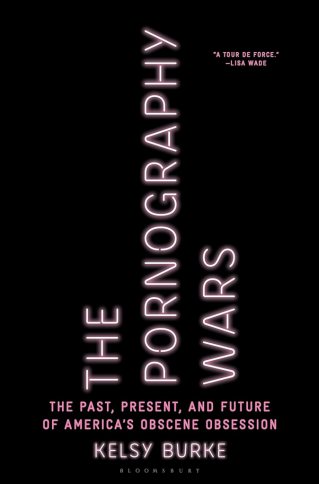Review | ‘The Pornography Wars: The Past, Present, and Future of America’s Obscene Obsession’ by Kelsy Burke
One Thing is Clear, the Debate About Pornography Will Not End Anytime Soon

In the preface to The Pornography Wars, Kelsy Burke explains her methodology as a sociologist, writing that she doesn’t assume that others who hold beliefs radically different from her own are liars, dupes, or villains. Adopting a nonjudgmental stance is a necessary prerequisite to having a rational discussion of obscenity, sex, and pornography, subject matter that has historically been divisive. Burke cites the example of Jerry Falwell, the founder of the Moral Majority, and Larry Flynt, the producer of Hustler magazine, to illustrate the complexity of the issue. Falwell famously sued Flynt in what became a pitched battle over pornography and free speech, and yet, this didn’t prevent the evangelist and the pornographer from exchanging Christmas cards for many years after the U.S. Supreme Court ruled in Flynt’s favor. Porn, like politics, has its share of strange bedfellows.
Burke is an associate professor of sociology at the University of Nebraska-Lincoln and the author of Christians under Covers. For a decade she has studied how sex and religion collide in America. A recipient of a National Science Foundation award, her work has appeared in many mainstream publications. “The pornography wars,” she writes, “are fought within a broader context of American history, where people who are white, straight, and Christian have been calling the shots when it comes to norms and laws related to sexuality.”
The word “pornography” stems from Greek and was first used to describe erotic artwork, some of which was thousands of years old. Today, pornography describes both a genre of sexually explicit media and a specific kind of relationship. Burke writes, “Pornography does something for us as a society. It is a socially constructed concept, like money or the English language, and thus meaningless without collective agreement.”
Collective agreement is, of course, the rub. Pornography intersects with politics, religion, morality, identity, and privacy. Burke examines the history, from the time when discussions of sex and sexuality were dominated by religious authorities, to the shift that occurred when researchers and doctors began to speak and publish under the rubric of those disciplines. Alfred Kinsey, Masters and Johnson, and others broadened the discussion at the same time the Reverend Billy Graham was decrying the immorality he believed was sweeping across the nation; cheap and filthy was how Graham described sex in America in the early 1950s. Religion and sex were conjoined, but race always hovered nearby; Black men struggled against stereotypes of sexual aggression, while Black women were believed to possess a beguiling sexual finesse.
It’s tempting to blame the internet for the ubiquity of porn, but citing survey data Burke argues that America was porn crazy before the advent of the internet. As she notes, by the turn of the 21st century, pornography had seeped into television, movies, magazines, and music, leading some commentators to describe the culture as hypersexualized. Still, the internet is the primary battleground for makers and consumers of porn, altering the economic dynamics for sex workers and giving rise to an industry dedicated to rescuing the primary consumers of porn, young men, from porn addiction. Burke devotes considerable space to these aspects of the debate. She also wades into sex education in public schools, surveying the two main branches of curriculum, abstinence-focused and comprehensive. Only 15 states require that sex education be medically accurate, and just 16 mandate teaching about contraception. It’s a patchwork system without universal standards.
Suffice to say that sexual politics is never simple. Inconsistent conclusions about pornography’s harm or harmlessness echo throughout The Pornography Wars. Though they don’t often admit it, there is truth to claims made by antiporn advocates and those who take a more porn-positive attitude. The conclusion Burke offers is that people experience pornography based on a variety of factors, including their sexual identity, personal experiences, and core beliefs about sex. But if there’s one thing this book makes clear, it’s that the debate about pornography will not end anytime soon.
This review originally appeared in the California Review of Books.




You must be logged in to post a comment.